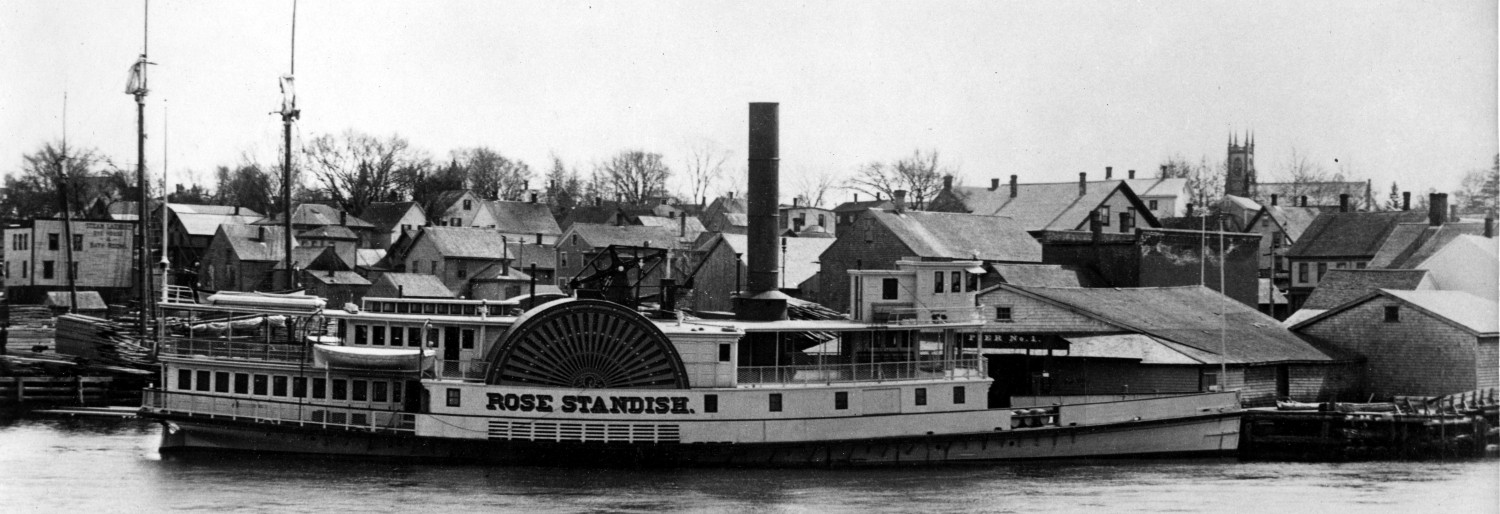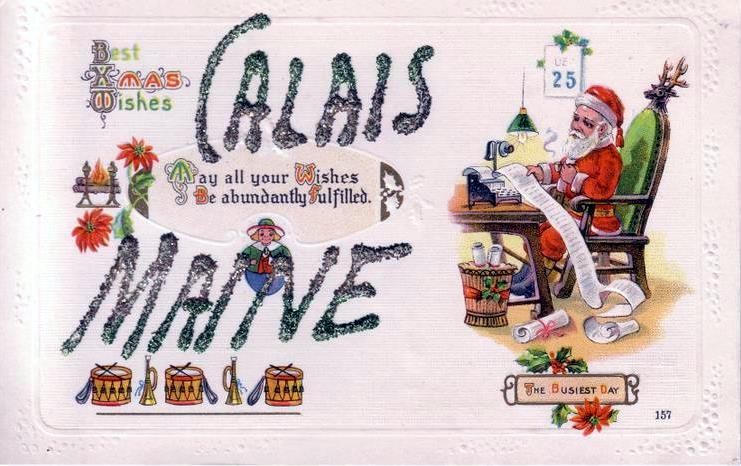
Merry Christmas from the St. Croix Historical Society. The Christmas card above was probably sold at Ryan’s Book Store on Main Street in Calais about 100 years ago when it cost only a penny to mail and the postcard was what passed as today’s email. We thought it would be enlightening to review our collection of diaries and reminiscences to see if the celebration of Christmas has changed over the years. The answer, not surprisingly, is yes and quite dramatically. To say Christmases of yore were low key compared with today is a considerable understatement. For much of our history, especially on the farm where most people lived, there was no “Christmas Season” unless one counts the days before Christmas when gifts for family and friends were often lovingly crafted by hand. Christmas usually began, if at all, on Christmas eve and by the 26th the holidays were over – the ball had yet to drop in Times Square. We’ll start with Fred Keene’s recollection of a Red Beach Christmas on the Keene farm about 1900.
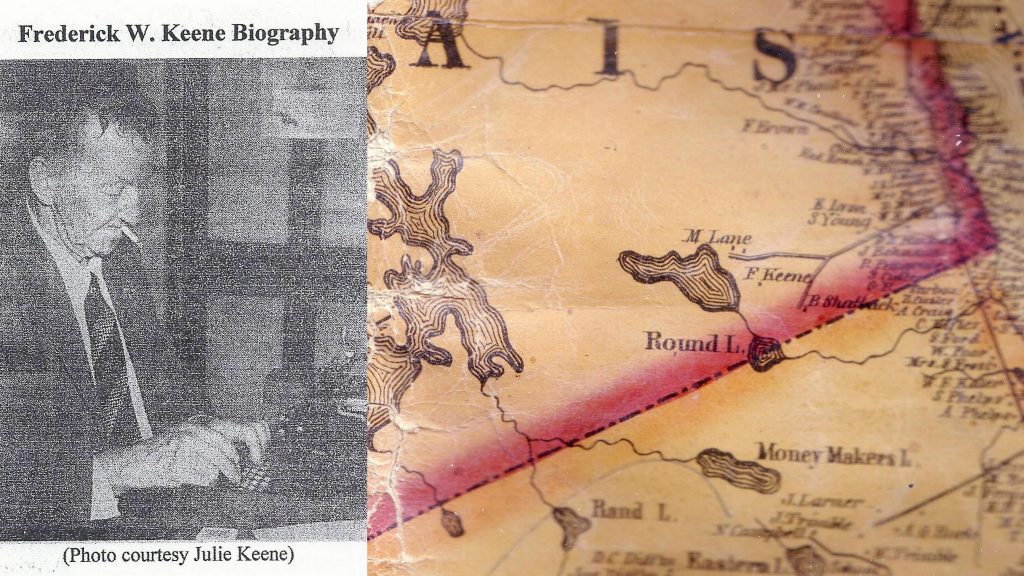
Fred Keene was born in 1876 and followed the path of his Aunt Henrietta Keene into journalism. He grew up on the Keene Farm on Keene’s Lake-now the Keene’s Lake Campground. In an article written probably in the 1940’s he describes a Christmas on the farm when he was young, probably in the 1890’s:
CHRISTMAS ON THE OLD FARM WAS HIGH SPOT OF THE YEAR
Gifts Were Mostly Hand Made. Tree was Lighted With Home-Dipped Candles, and Uncle John Played Santa Claus as Family Joined in Old-Time Christmas Observance
By F. W. KEENE
RED BEACH, Dec. 20–There were only two real holidays on the old farm– Fourth of July and Christmas. The other holidays, like Thanksgiving and New Year’s might be faintly observed with a little extra on the menu– turkey on the one and probably rabbit stew on the other.
Such holidays as Arbor Day, Columbus Day, Flag Day, and Navy Day- would have been regarded as a waste of valuable time for nothing at all, and the schools kept on Washington’s and Lincoln’s birthdays, for the teacher said that these heroes would have been pleased to know the children were trying to be President or at least a President’s wife.
Armistice Day, happily, was still in the archives of the future and Labor had not yet attained an eminence where it could stretch out a hand to still the sounds of the axe, hammer, and tools of iron.
And so the boys concentrated upon these two outstanding days as a time to let themselves go a little, saving bungdowns and three-cent pieces and big heavy copper coins that said “2 CENTS” in a framework of laurel leaves, earned by piling heading noontimes, or squashing potato bugs, or picking over cranberries by lantern light in the woodshed, or sprouting potatoes in a damp cellar.
By December 20 there was generally a fund on hand sufficient to buy something for Ma anyhow, or the baby. The stores were not exactly stocked up for the occasion, and whatever gift was presented had been lying around in the window and it was a little sunburned or faded. So most of the gifts were homemade, representing ingenuity and labor of which is after all the spirit of Christmas.
For weeks ahead of the holiday there were whispering and scurryings from room to room when someone entered and caught the gift-maker in the act– slipper cases for Grandfather, or a newspaper rack, or a bundle of shaving paper, saved from the tissue that came, around the old English matches in flat cards, now vanished with the bootjack and the “comforter.”
Jimmy was too young to make anything except something very simple but he cut a big strawberry from red flannel, sewed it up and filled it with powdered emery he brought from the polishing mill for a needle sharpener.
Grandma was the gift-maker extraordinary. She sat careless of who saw her, for she was too big to hide in a closet and clicked her needles through the yarn she sheared, carded, spun, and was now transforming into warm, woolly mittens, scarfs and stockings for the family. “Try this on, sonny,” she would say after she had begun to “thumb out” a mitten.
Jimmy knew what he was going to get from Ma. As for Pa, he didn’t seem to know what it was all about, only raising his head to sniff as the oven door was opened to let out a savory aroma.
Food was always good on the farm but, it was a little better at Christmas– more sage and summer savory and a bottle of the ketchup Aunt Maria made last summer. Aunt Maria was a dressmaker, and right then was fixing up a new gingham wrapper for Ma, who knew all about it but said nothing.
Jimmy hankered for things like knives and a sled, and having only one skate, wished for a mate to it, so that he would be able to play “corum” and not merely go round in a circle and be laughed at. Molly wanted some candy besides the old-fashioned molasses sticks made at home and “pulled” white.
All Ma wanted was to have the children well and someone to help her wash dishes. Aunt Maria was wishing for Hoyt’s German Cologne and Hood’s Tooth Powder, advertised in Godey’s Lady’s Book. There had come a bunch of blotters all saturated with cologne and the scent mingled with that of the shiny fir that Jimmy cut and dragged home off the mountain, a mile when he could have got a better one in the grove behind the house.
It was planned to have Uncle John and Aunt Thirsa and their boy come down for the day but the Dolly Varden was delayed on her upriver trip and they arrived after the wishbone had been hung up to dry for hauling apart at New Years. Uncle John’s mustache was covered with icicles and his buffalo coat was matted with sleety snow. He, it turned out, was slated to be Santa Claus, but did not relish the job, having handled edgings on the down trips until his hands were alive with hemlock splinters. He sat down and counted out his trip money and split with Grandfather who owned the lighter and Grandfather gave him a gold piece for Christmas, which made him decide to be Santa after all.
The tree was ornamental. No gifts were hung on it. You couldn’t hang a dress or a sweater or a sled on it and still have that bunch of tallow candles, made last fall at killing time out of the internal revenue of Old Buck, the fat Ayshire steer, sacrificed in time to have the sirloin included in the Christmas menu. The little fir was hung with strung cranberries and popcorn, and the grease of the hot candles made a sort of hungry smell, like a burning joint of pork.
When it got good and dark and the youngsters had been itching and listening to the tramping in the front room upstairs, someone called “all ready” and there was a rush up the stairs and a dead silence and “Oh’s” and “Ah’s” as the beauty of tree burst upon them.
The airtight had been set up and the asphalt was burning off the new pipe as there came a pounding at the door. Everybody had forgotten about Uncle John. Aunt Thirsa said he had to go to the barn and bed down Old Fannie for she had cut her leg in the crust and he had to put tar on it and might not be back till later.
The door opened and there as big as “Billy-be Darned”, was Santa, gosh knows where from. In the excitement we noticed the white button Aunt Thirsa had sewed on the buffalo coat and under the circumstances no one asked questions, for he had a sack of stuff that promised a lot but turned out to be nothing but coal. It made a good impression though.
Then the distribution. Jimmy and Freddy had books too old for them but appreciated in after years¬-“Maximillian and Mexico,” the history of the first attempt at such colonization as may be now in certain European minds, “Lives”, of this one and that and with them “Scholar’s Companion” and– oh joy!– a receipt for a whole year’s subscription to “Harper’s Young People.” Candy bags, nuts and raisins, a mouth organ, passed from hand to mouth regardless of germs, handkerchiefs quarried out of sheets that were toenailed too thin for warmth and had to be sliced up and hemmed to absorb the sneezings inevitable in a Maine winter.
But better than all was the next arrival– the father of three youngsters who wanted to come and spend the winter. They were strangers but they knew the hospitality of the farm and they were in an instant made members of the family circle ¬and remained for seven years. They had gifts, too, for they were prosperous– only lacking that greatest gift– a mother.
They were the center of attraction that night and it was a late clock that ticked them out of the Christmas room and down by the Open Berkley, where they lay on the hooked rug and cracked nuts and told ghost stories by the flickering flame of the old seasoned maple logs and cloyed with sweets from the city candy stores.
As existence in the cities becomes more turbulent; as times change from easy to difficult; as the cost of life and living becomes threatening almost to desperation: men and women of middle life hark back to these days, and wonder what has happened. They view with alarm a new attitude towards a Christmas in which worries accumulate as people wonder what they may do to please the new and exacting generation, no longer satisfied with simple lives and pleasures, and they say, if only to themselves, “Those were the days.”
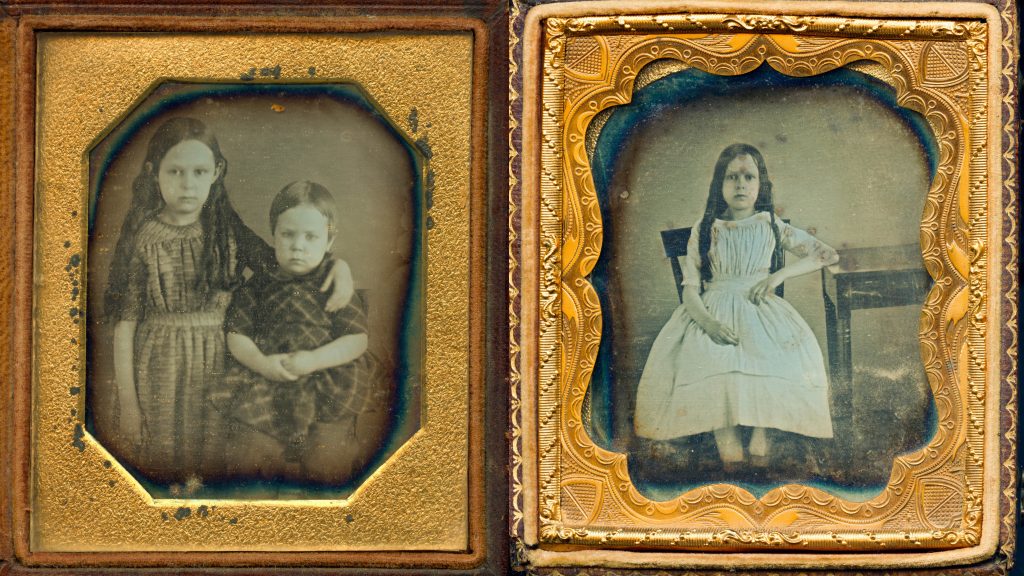
An even earlier account of Christmas in Calais is contained in “Nellie’s Diary” written by Ellen “Nellie” Holmes in 1851 who is pictured above in early daguerreotypes, one with her brother Frank Holmes. She was 11 in 1851, Frank was 7. Anna, aged 12 and Agnes age 14 mentioned in the diary entries were Nellie’s older sisters. Unlike Fred Keene Nellie was a city girl for Calais was in 1850 one of the largest and most prosperous cities in Maine.
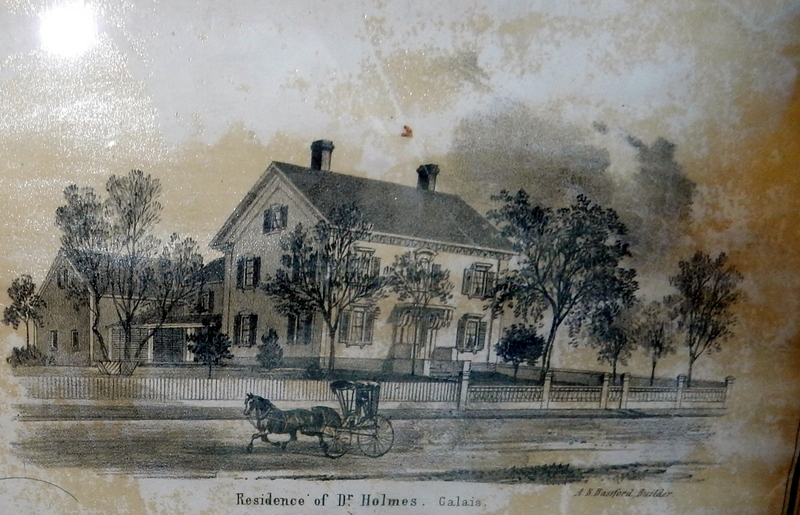
In 1851 the Holmes children had just moved from the family’s small cape on Main Street, the Cottage as it is now known, next door to the new built Holmestead with their parents Dr. Job and Vesta Holmes. It was in this elegant historic building now owned by the Historical Society that Nellie made daily entries in her diary.
Christmas entries from Nellie’s Diary 1851:
Monday, Dec. 8th, 1851
This morning it snowed a little and towards noon it began to rain and has rained nearly all the time since I don’t believe there will be a lot of snow left tomorrow. School will be done at the end of this week and then I shall have time to make some Christmas presents if I make any. We are all going to Mrs. Cooper’s Christmas Tree. I was invited to Hatty Barnard’s and perhaps I shall go to both for one is Christmas Eve and the other Christmas night.
Saturday, Dec. 13th, 1851
This afternoon I bought some of my Christmas presents but I bought something for Anne that was real silly so I am going to get Agnes to go with me and put some of her money with mine and if Mr. Harrison will take it back then we will buy her a purse together. The present I bought Annie was a real pretty little glass boat with a little painted glass goose in it. I did not buy either Agnes or Father any present. I did not buy any for Father because it would take a great deal of money to buy him a good one and I did not buy Agnes any because I did not have enough money left to buy her a decent one. School did not close as I thought it would this week but I believe it is going to close in another week.
Wednesday, December 17, 1851
I went up to Mrs. Cole’s this afternoon with Alice Pike to get two birds that she was going to give, one was Dick and the other was Susan. We got some beautiful rides. Georgie Perkins came here today and asked us there Christmas Day. There were some first-rate slides in the garden today. Mother has gone to the Wednesday evening meeting and I have got to pare a lot of apples. Annie and I will be through the Bible tonight and tomorrow we are going to begin the Apochraphee [Apocrypha]. We began to read the Bible more than two years ago. I went with Frank to buy his Christmas presents this afternoon he bought four of them.
Friday, December 19, 1851
I went up street this noon with Annie to buy a basket for a Christmas present for Mother. She also bought a piece of wax to go with it. Father gave her ten cents as she had 97 and a half cents. Frank and I have been paring some apples tonight, we pared and sliced a great pan full. I am going to sit with Joanna McAllister next term. When we went after the milk tonight Frank took his sled and we slid a good while before we went for the milk. Tomorrow is the last day of school. I do not know how long a vacation we are going to have but I suppose it will be about two weeks.
Sunday, December 21, 1851
I went to meeting in the morning but I had to stay home in the afternoon to keep house as everyone was to meeting. Last night the frost touched one of the leaves of her geranium a little but not enough to do it harm. Frank and I are going to see if we can get five cents and buy Eddy McMann a jumping jack for a Christmas present Mother owes us four cents and if she will give us one it will please him. Mother and Father and Mr. Lathrop have gone into Mrs. Barnard’s and Agnes has gone to meeting so there is hardly anyone left at home. I watered Annie’s bergamot today and it drank much as a pint of water.
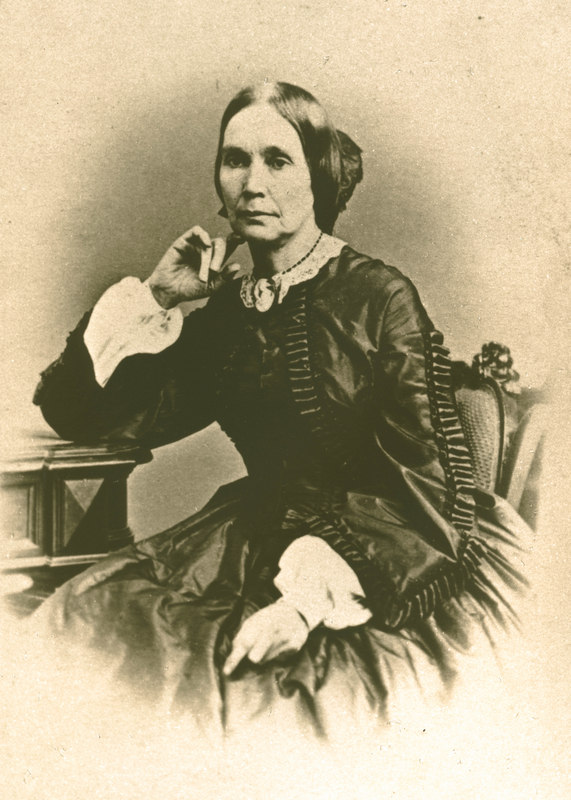
Monday, December 22, 1851
I went up street this morning with Anna to buy some of her Christmas presents. She bought some beauties especially [for] Agnes. Mother went down cellar today to put some wood in the furnace and she slipped on a nail and ran it way into her foot and Father says he does not know but it will make her lame. Mother has bought Agnes her present, it is a string of corals and Anna’s is a comb to go round her head. She has not bought mine yet. Agnes and Miss Tash and Father have gone up to the sing tonight up to the City Hall.
Tuesday, December 23, 1851
Agnes finished her wristers tonight, they look real pretty. She went in with Miss Tash to the meeting house to help trim it. Miss Tash began a watch case for a Christmas present to Cousin Augustine. It is going to be orange. Mother has been making some real pretty little baskets of paper to put the sugar plums in, they look beautifully. Anna and Agnes, Frank and I put some money together to buy Margaret Perry a Christmas present. We bought her a real nice little doll and Agnes has dressed it real pretty, and then Anna thought that she would buy Barbara something and so Frank gave six cents and Ellen Flint gave six and they bought her a little flat-iron and stand. We are going to carry them up Christmas morning and give them their presents.
Christmas Eve, Wednesday, Dec. 24th, 1851
We are going to the Cooper’s Christmas Tree and I expect to have a real nice time. Mother says that I am going to have a real handsome present and she will not tell me who from. Agnes and Anna are going up to Mrs. Perkins tomorrow to stay all day. I am not going because I am going to the Christmas tree in the evening.
Christmas Day, Thursday, December 25th, 1851
This morning Frank came in to our room and woke us up shouting “Merry Christmas” in our ears. After breakfast Anna and I went up to Mrs. Flint’s to get Ellen to come up to Mrs. Perry’s and carry them their presents. Mrs. Flint gave them all a thimble apiece and the boys, a lot of wooden soldiers and Mary a comb, two pencils and a box. It was very windy and the wind blew round into your face but Ellen Flint and I went up to Laura Bassford’s and wished her a “Merry Christmas”. Last night we all went to the Christmas tree and I got a game of “conversation cards” from Anna, a silver pencil and a gold pen inside of it from Mr. Lathrop and a little velvet doll from Hattie Barnard. Agnes got just what she was wishing for, a string of corals and Anna got a comb to go around and Frank got a beautiful knife, a pair of wristers and some other things.I went over to Hattie Barnard’s tonight. Frank did not go because he was too tired and did not want to. I did not get anything new on that tree because I had all my presents on the other one. After they had all got their presents we had a dance. Agnes and Anna walked up to Mrs. Perkins in the snow this morning but they rode home.
In 1852 when Nellie was 12 her diary entries which mention Christmas begin only on the 24th. It appears the family was celebrating by having daguerreotypes taken – probably those of Nellie and Frank shown above were taken on this occasion.
Friday, December 24th, 1852 – Raining this morning and this noon it rained. I took Harriet to school this morning though it rained but she did not go this afternoon. As I was coming home from school this afternoon she was in the door and called me and gave me my corals. They are very pretty and Mother says that for a New Year’s present she will get me a gold clasp. She would have given it to me for a Christmas present only it is so wet she could not go out. It is the only one I shall have. Annie Barnard bought a quarter of a dollar cologne bottle and she broke it and bought another and sent it over. Mother gave Frank a pair of slippers for a present and Agnes a bird whistle and Annie and I gave him his game. I carried Frank’s present to Nelly Perkins and she sent Franky a little silver pencil. We gave Mother her pearl salt spoons that we all bought. She said she liked them better than silver. I paid a quarter of a dollar and Agnes and Annie paid ninepence. I went up and paid the four cents that I owed Mr. Jackson. Mother told me that in Agnes’s locket we are going to have Father’s, Mother’s, Agnes’s, Annie’s and Frank and me. Mr. Dyer (the schoolmaster) has been most dreadful cross today. It stopped raining this afternoon.
Saturday, December 25th, 1852 – This morning I went out a slid awhile and then went in to Harriet Barnard’s and she showed me some of her presents. She had a string of corals and an elegant gold clasp that cost a dollar. I never saw such a beauty. She got a beautiful gold ring, too, from her mother, a pair of mittens and some armlets, and I suppose a dozen other things. Annie Ingles and I took her way down to Mrs. Young’s on my sled, most a mile, and when I found the folks ready to take a ride. Charley, Cal Perkins, Annie, Ag and I went over the river and two teams ran into each other and one of the horses fell down. When we came home Mother said it was too late to have our daguerreotypes taken. Father told Agnes all about her locket and she says she is a little ashamed of how she has been grumbling. She did not get any present. This afternoon we went up to Mr. Robbins but he said it was not a good day to take miniatures and he had one lady to take one for, so he told us to come in some other day. We went to drawing school but I did not do hardly anything but ? my piece because I had no crayon holder or crayon. In the evening Sue Kelley and Lizzie Lee came in and we all went out an slid. In the evening Charley went up and got some cider.
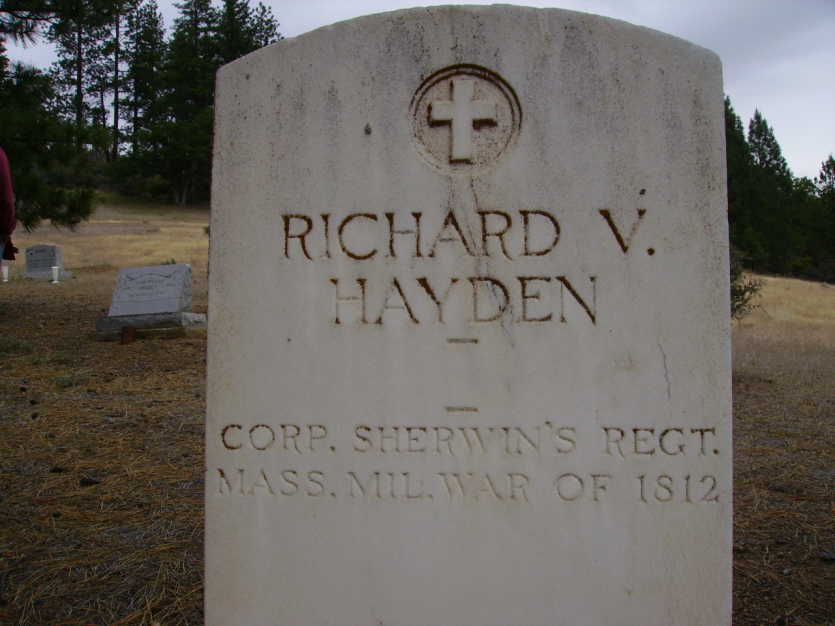
The most extensive local diaries we have are those of Richard Hayden of Robbinston which cover the period 1821-1865. Unfortunately we have no photo of Richard Hayden, only that of his gravestone which is in the Callahan Cemetery in Callahan California. Hayden was a jack of all trades- school teacher, surveyor- he surveyed much of Washington County and held many town offices, drafted deeds, arbitrated legal claims and testified as an expert witness in land disputes at nearly every term of court in Machias. He also skipped Sunday church on a regular basis to solve complex math problems he received by mail from Boston.
Hayden moved to California late in life to live with his son who had gone west in search of gold. Hayden kept a daily diary so we have many Christmas day entries. In 1821 and 1822 Hayden, then Robbinston schoolmaster, canceled school on Christmas day but in all subsequent years school was held even on Christmas. In none of his December 25th entries does he mention gifts for his children or any special activities.
On December 25th the diary entries say he worked on the roads, sometimes went to the grist mill in Perry, to Calais on business, split wood, drafted documents and surveyed lines. Except for one occasion when he dined with Thomas Vose and another when he attended a party at General Brewer’s we get the impression from the Hayden diaries that Christmas was not much celebrated in Robbinston from the 1820s to the 1860s.
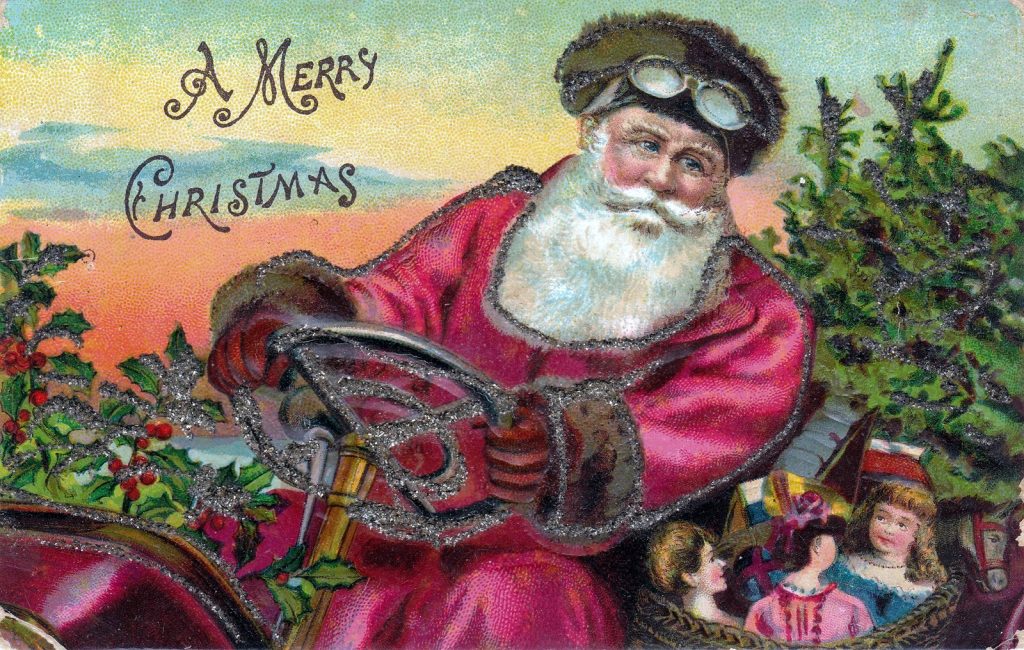
One missing Christmas staple of those early years was Santa shown above in 1910 when he had abandoned his sleigh for that new fangled contraption, the automobile. Santa is not mentioned in any of the old diaries probably because he remained a controversial figure in those early years. The celebration of Christmas as a holiday of merriment and amusement was frowned upon by the strict religious orders of the day, especially the Congregationalists. To his credit, Edward Stone, the minister of the Unitarian Church to which Nellie Holmes belonged, is said to have erected Calais’s first Christmas tree at the church in 1843. Of course the Unitarians were regarded as far too liberal and permissive by the other sects, but Mr. Stone may have been encouraged by a 1842 article in the Calais Advertiser asking folks to lighten up:
The custom of keeping Christmas as a Holiday commends itself to all who are not too puritanical in their religious nonconformities. A general observance of this day would be an improvement in the customs of New England. Our youth particularly need days of recreation and merriment, and Christmas with utmost propriety might unite all in the observance of this day. The legend or fable so current among children, respecting St. Nicholas’ visit every year is quite innocent, if freed from all superstition and occasions among children every Christmas morning, early rising and much hilarity to find their stocking well filled with sweetmeats etc brought down the chimney the previous night by old St. Nicholas, pronounced Sandy Claws by a singular corruption.
The following invitation to old San Nic’las was found Christmas morning pinned to the stocking of the children of a family in Calais-supposed to have been written by the children the evening before: Come down,come down, good San NicklawsWe like a treat from your sable paws,We like to taste of the sweet good things,Which every year old Christmas brings.Come down from chimney top or tower,To cheer with fruit the festive hour,The year to crown and the year to closeAnd bless our stockings and swell our hose.Thou’rt sent,’tis true, by higher Power,Than dwells in Turret, or in Tower.And while we love the good gifts in view,We’ll love, unseen, the giver too.
So while we may have gotten coal in our stockings this year, if we act as good and responsible citizens in these trying times, Sandy Claws may return next year with “sweet good things” and, who knows, perhaps a set of pearl salt spoons which the family will treasure forever.
(If you would like to read more from Nellie’s diaries, keep an eye on our publications page, as we are preparing a new edition of the collection with never-before-seen entries following the discovery of old texts.)
